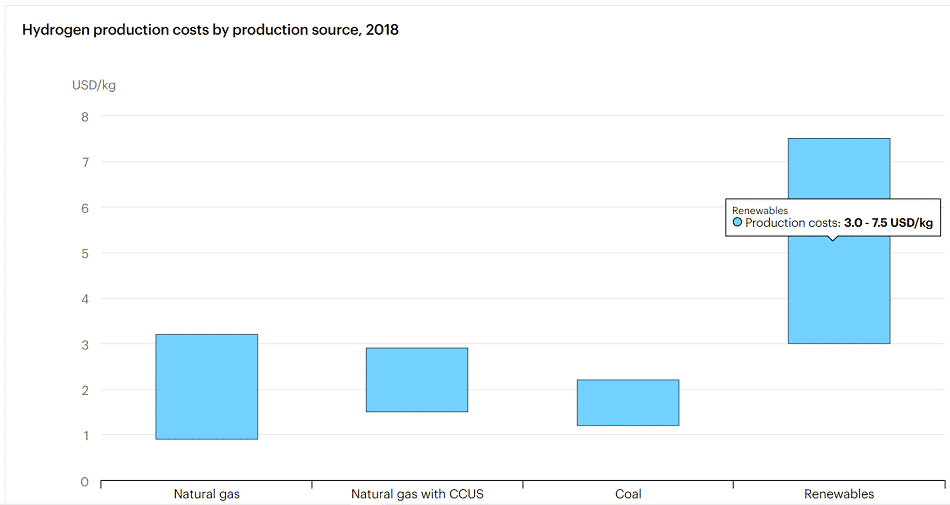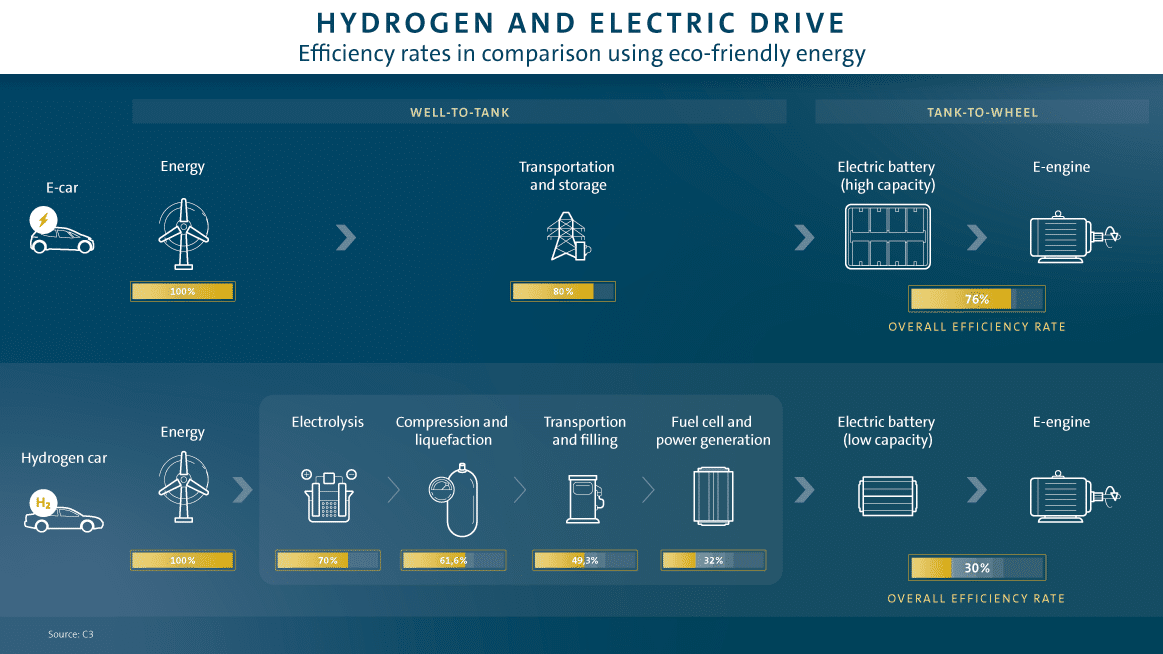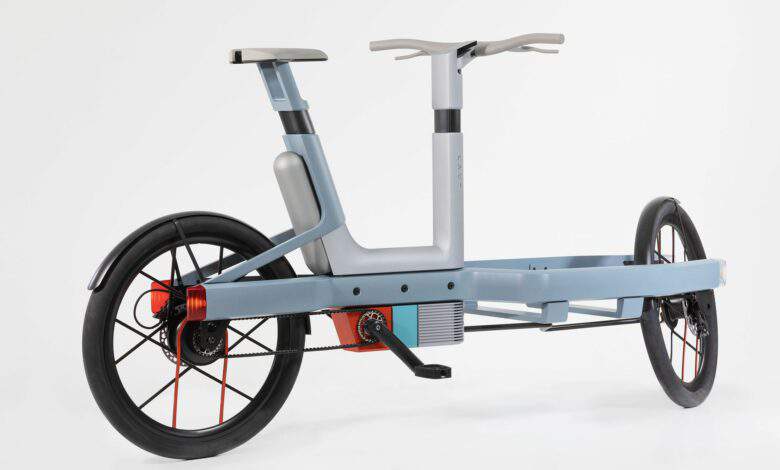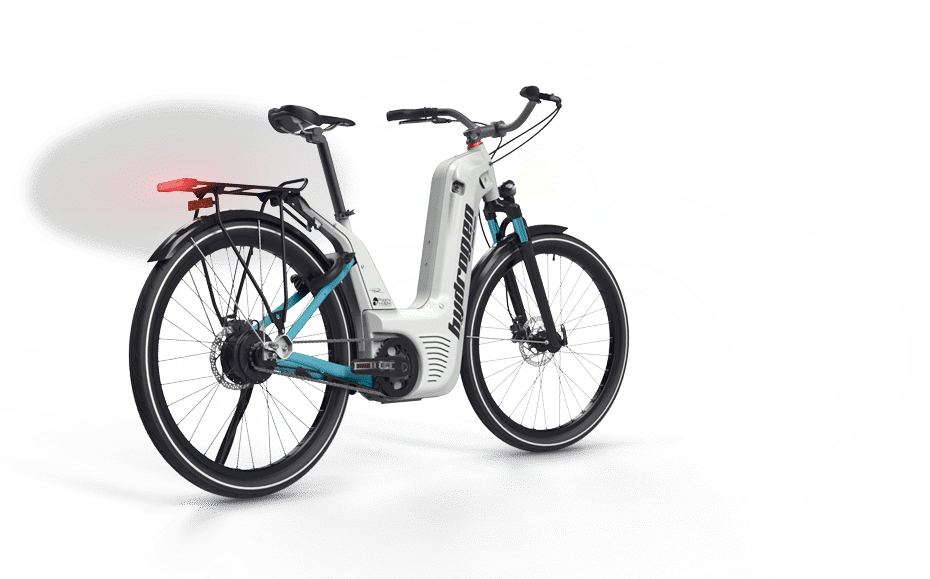There is a lot of hype around hydrogen as a clean source of energy. Hydrogen fuel cells ebikes are already for sale.
- Hydrogen fuel cell ebikes are already on the market
- in two minutes, they can be refueled to ride 150 km
- still, hydrogen refueling stations are rare
- their advantages and disadvantages compared to traditional ebikes
Hydrogen fuel cells, what you should know
The fuel cell is a device capable of converting hydrogen into electricity. Their cost per watt hour is roughly 3 times more than that of a battery. This comparison is not very appropriate, since a fuel cell doesn’t exactly store energy, but can give you an idea of the costs involved. Indeed, a medium sized electric car needs either a 50 kW battery or a 50 kW fuel cell stack to drive conveniently, the former costing roughly €10,000, the latter some €30,000. These are only estimations deducted from electric cars and the most common fuel-cell car available, the Toyota Mirai. Since this midsized sedan costs at least €70,000, and a comparable Vw ID 3 starts at €40,000 (subventions excluded for both), the price difference is clearly attributable to the pricey fuel cells.

Production cost of hydrogen, courtesy of IEA
Hydrogen, some key numbers
Production and storage costs
Hydrogen is the most common element on earth. It can be produced either from natural gas, from biomasses, or via electrolyze, separating it from water with a lot of electricity. To put it simply, it takes the equivalent energy of 2 L of oil to produce a liter of hydrogen, with cost varying from one source to another, also depending on the country where hydrogen is produced, see the picture above from a very interesting report of the international energy agency (IEA). The energy density of hydrogen is about three times smaller than that of natural gas. Indeed, hydrogen propelled cars and trucks have got about the same range of gasoline ones, but require much bigger and expensive hydrogen tanks.
We must also take into account that storing hydrogen requires high-pressure tanks, at least 70 bars. They are more expensive than regular gasoline or diesel tanks. Just take a look at Toyota Mirai’s specifications. Nevertheless, all these extra costs can be compensated because hydrogen is not taxed, since it doesn’t harm public health, unlike fossil fuels which cause respiratory and cardiovascular diseases, cancers, on top of soiling buildings and monuments with exhaust pipe and chimney emitted particles. In the end, Toyota can boast on the above mentioned website, that hydrogen refueling costs just like gasoline, to drive for a comparable distance.
Volkswagen explain in the picture below that they don’t invest in hydrogen cars, because of their inferior overal efficiency rate.

Hydrogen vs. electric car efficiency – courtesy of Volkswagen
Hydrogen production and consumption, environmental impact
Green hydrogen: hydrogen production can be either polluting or very ecological, depending on the source. If we are to produce hydrogen with renewable energies, through electrolyze, is very ecological; moreover, it can become cost-efficient if used to store the excess energy produced by wind and solar when there is a lot of wind and sun. In a country like Germany, sometimes a strong wind increases wind electricity production up to 110% of the nationwide demand. Also producing hydrogen through biomasses is quite ecological.
Gray hydrogen: if hydrogen is produced with natural gas, through methane steam reformation, the byproduct is CO2, in quantities even bigger than those emitted burning the same amount of gas.
Blue hydrogen: oil companies claim that they can sequestrate up to 98% of the CO2 emitted producing hydrogen through methane steam reformation. It remains to be seen, critics say that they can’t sequestrate more than 50%.

Mom Design & Lavo – hydrogen e-cargo bike
Hydrogen ebikes advantages
As far as I know, there is only one company producing and marketing a hydrogen fuel cells ebike. Pragma Industries Alpha ebike (see photo on top) delivers the same performance of battery ebikes in terms of speed and torque, but can boast a range of 150 km with 2 L of hydrogen, and two minutes refueling time.
Disadvantages of hydrogen ebikes
From an ecological point of view, is difficult to compare hydrogen fuel cells and batteries, since there are too many variables playing a decisive role, regarding how you produce electricity and hydrogen, how well you can recycle batteries, and so on. We should also reckon that an ebike battery needs an average of 1 kW of electricity for 100 km, peanuts.
The bigger disadvantage of hydrogen propelled ebikes is the rarity of refueling stations. Nowadays we can count on 90 stations in Germany and 30 in France, that’s why in the Netherlands, Mom Design and LAVO, a fuel cells company, intend to produce a hydrogen fuel cell e-cargo bike which will be refueled by a photovoltaic refueling station.
Their price is also higher: a Pragma Industries Alpha ebike sells for 7,500 Euros.
Conclusion – Mom and Pragma have nailed it
The greatest advantage of fuel cells ebike is their wider range. On the other hand, they have a hard time refueling, considering the scarcity of hydrogen refueling stations. It will take many years to develop a consistent network. That’s why hydrogen ebikes seem viable especially, and probably exclusively, for delivery fleets. Think of a delivering company, or a postal service. They need cargo ebikes with a decent range, at the same time it’s easier for them to invest in solar refueling stations which could serve hundreds of ebikes at the same warehouse. Similarly, Pragma seems to bet on customers who can concentrate their ebikes in the same location, listing them as Public services, Territorial staff mobility, Corporate staff mobility, Last mile delivery, Tourists rental and Bike sharing programs.
The ecological impact of the fuel cells ebikes, like that of hydrogen vehicles in general, remains to be seen.




This article about hydrogen is completely misleading or maybe author does not have enough education about H2 technology . The whole idea is not to carrying a big amount of hydrogen gas, but H2 generator will be included in system. Gas from this generator will run H2 engine, which now achieve power of 110KW, what is very powerful. You will not need a H2 gas cylinder, but only regular water tank for source of H2.You need only initial source of power for generator to start process like you need for gas engines.
H2 is for sure future of cars and bikes -very clean technology -NO POLLUTION!!!
Hello,
Thank you for your interest. Hydrogen is clean if produced through electrolyse, requiring a lot of electricity, or from natural gas (polluting but cheaper) although it takes two liters equivalent of gas to produce hydrogen giving the equivalent power of one liter of liquified gas. It is expensive, and fuel cells and hydrogen tanks are too. I hope it will become viable in the near future. Indeed, no hydrogen propelled e-bike, car, truck, train or ship is equipped with an hydrogen generator (through electrolyse or other), what would be too expensive, big and heavy. Nobody is planning to have an hydrogen generator on board of any vehicle. If such an e-bike or vehicle exists, be so kind as to notify me. There are less than 5,000 hydrogen cars running on this planet. Still way too expensive.
Cheers,
Luca
Dear Luca, we have a technology that operates on trial vehicles at the moment and we are 3 million miles into the trial. We are ready for production. Our in line electrolyser breaks water down into H2 and O2. The O2 is exhausted and the H2 is fed into the fuel pipe, where it mixes with the fossil fuel (any – diesel, gasoline, LPG) and boom! we have a ICE that has about 60-80% improved fuel consumption and commensurate reduction in emmissions – contact me any time
Dear Steve,
Watson & Fine looks electrifying. I’ll call you tomorrow.
Thanks
Luca
Dear Steve,
i am looking forward to develop a hydrogen fuel cell powered Bicycle and Scooter for India as charging e bikes is a major hurdle in India. i would like to connect with you for the same
regards
vanit